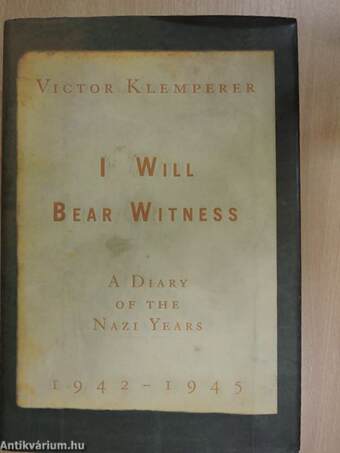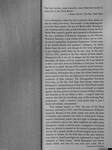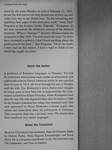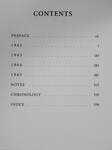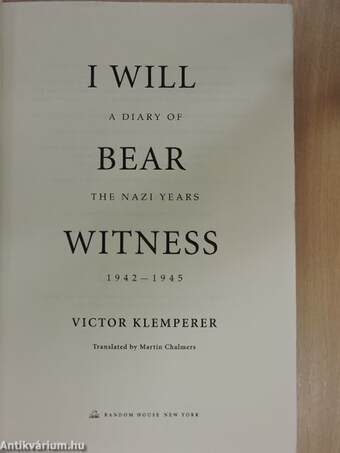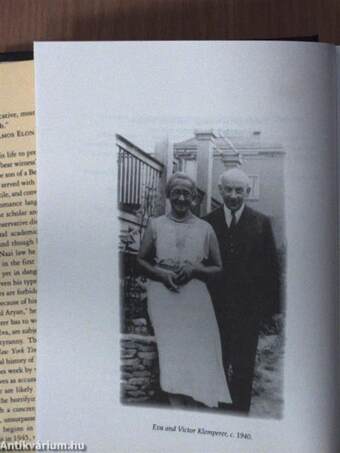1.072.893
kiadvánnyal nyújtjuk Magyarország legnagyobb antikvár könyv-kínálatát

VISSZA
A TETEJÉRE
JAVASLATOKÉszre-
vételek
I Will Bear Witness
A Diary of the Nazi Years 1942-1945
| Kiadó: | Random House, Inc |
|---|---|
| Kiadás helye: | New York |
| Kiadás éve: | |
| Kötés típusa: | Ragasztott kemény kötés |
| Oldalszám: | 556 oldal |
| Sorozatcím: | |
| Kötetszám: | |
| Nyelv: | Angol |
| Méret: | 24 cm x 17 cm |
| ISBN: | 0-375-50240-8 |
| Megjegyzés: | Két fekete-fehér fotóval. |
naponta értesítjük a beérkező friss
kiadványokról
naponta értesítjük a beérkező friss
kiadványokról
Fülszöveg
The best written, most evocative, most observant record of daily üfe in the Third Reich.
—Amos Elon, The New York Times
Victor Klemperer risked his life to preserve these diaries so that he could, as he wrote, "bear witness" to the gathering horror of the Nazi regime. The son of a Berlin rabbi, Klemperer was a Germán patriot who served with honor during the First World War, married a gentile, and converted to Protestantism. He was a professor of Románcé languages at the Dresden Technical Institute, a fine scholar and writer, and an intel-lectual of a somewhat conservative disposition. Unlike many of his Jewish friends and academic colleagues, he feared Hitler from the start, and though he felt little allegiance to any religion, under Nazi law he was a Jew. In the years 1933 to 1941, covered in the first volume of these diaries, Klemperer's life is not yet in danger, but he loses his pro-fessorship, his house, even his typewriter; he is not allowed to drive, and since Jews are... Tovább
Fülszöveg
The best written, most evocative, most observant record of daily üfe in the Third Reich.
—Amos Elon, The New York Times
Victor Klemperer risked his life to preserve these diaries so that he could, as he wrote, "bear witness" to the gathering horror of the Nazi regime. The son of a Berlin rabbi, Klemperer was a Germán patriot who served with honor during the First World War, married a gentile, and converted to Protestantism. He was a professor of Románcé languages at the Dresden Technical Institute, a fine scholar and writer, and an intel-lectual of a somewhat conservative disposition. Unlike many of his Jewish friends and academic colleagues, he feared Hitler from the start, and though he felt little allegiance to any religion, under Nazi law he was a Jew. In the years 1933 to 1941, covered in the first volume of these diaries, Klemperer's life is not yet in danger, but he loses his pro-fessorship, his house, even his typewriter; he is not allowed to drive, and since Jews are forbidden to own pets, he must put his cat to death. Because of his military record and mar-riage to a "full-blooded Aryan," he is spared deportation, but nevertheless, Klemperer has to wear the yellow Jewish star, and he and his wife, Eva, are subjected to the ever-increasing escalation of Nazi tyranny. The distinguished histórián Peter Gay, in The New York Times Book Review, wrote that Klemperer's "personal history of how the Third Reich month by month, sometimes week by week, accelerated its crusade against the Jews gives as accurate a picture of Nazi trickery and brutality as we are likely to have a report from the interior that telis the horrifying story of the evolving Nazi persecution with a concrete, vivid power that is, and I think will remain, unsurpassed.
This volume begins in 1942, the year of the Final Solution, and ends in 1945, with the devastation of Hitler's Germany. Rumors of the death camps soon reach the Jews of Dresden, now jammed into their so-called Jews' houses, starved, humiliated, subject day and night to Gestapo raids, and terrified as, one by one, their neighbors are taken away. Klemperer is made to shovel snow, is assigned to do forced labor in a factory, is taunted on the streets by gangs of boys, but his life is spared, thanks to the privileged status of Jews married to Aryans. In the final days of the war, however, even Jews in mixed marriages are summoned to report for transport to "labor camps," which Klemperer now knows means death, and that his turn will soon come. He is
(continued on back flap)
(continued from front flap)
saved by the great Dresden air raid of February 13, 1945; he and his wife survive the fiery destruction of their city and make their way to the Allied lines. In the enthralling and appalling final pages of this miraculous work, wrote Niall Ferguson in the London Sunday Telegraph, "Klemperer all too soon encounters the deliberate amnesia of the defeated Germany: What is Gestapo? declares a Breslau woman he encounters in May 1945. 'I've never heard the word. I've never been interested in politics, I don't know anything about the persecution of the Jews. Says Ferguson, Of all the books I have read on this subject, I find it hard to think of one which has taught me more.
About the Author
A professor of Románcé languages in Dresden, victor Klemperer wrote several major works on seventeenth- and eighteenth-century French literature before he was expelled from his post in 1935. He lived through the war in Dresden with his wife, Eva. Klemperer's secret diaries were thought for many years to have been lost or suppressed by the Com-munist authorities of East Germany, where Klemperer lived after the war. His wife deposited them after his death in 1960 in the Dresden Landesarchiv, where they remained until they were uncovered by Victor Nowojski, a former pupil, who edited and transcribed them for publication in Germany. Their reception there was a national event. The diaries have been translated into twelve languages.
About the Translator
Martin Chalmers has translated, from the Germán, books by Hubert Fichte, Hans Magnus Enzensberger, and Erich Fried. He is a frequent contributor to the New Statesman and The Independent, and lives in London. Vissza
Témakörök
- Idegennyelv > Idegennyelvű könyvek > Angol > Szépirodalom > Regény, novella, elbeszélés
- Szépirodalom > Regény, novella, elbeszélés > Az író származása szerint > Európa > Németország
- Szépirodalom > Regény, novella, elbeszélés > Tartalom szerint > Történelmi regények > Koncentrációs táborok, holokauszt
- Szépirodalom > Regény, novella, elbeszélés > Tartalom szerint > Társadalmi csoportok > Kisebbségek > Zsidóság
- Szépirodalom > Regény, novella, elbeszélés > Tartalom szerint > Történelmi regények > Legújabb kor > Egyéb
- Szépirodalom > Regény, novella, elbeszélés > Tartalom szerint > Életrajzi regények > Önéletrajzok, naplók, memoárok
- Szépirodalom > Regény, novella, elbeszélés > Tartalom szerint > Kor- és társadalomrajz
Victor Klemperer
Victor Klemperer műveinek az Antikvarium.hu-n kapható vagy előjegyezhető listáját itt tekintheti meg: Victor Klemperer könyvek, művekMegvásárolható példányok
Nincs megvásárolható példány
A könyv összes megrendelhető példánya elfogyott. Ha kívánja, előjegyezheti a könyvet, és amint a könyv egy újabb példánya elérhető lesz, értesítjük.



